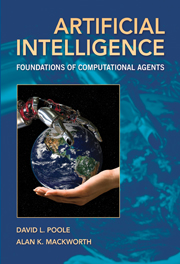Book contents
- Frontmatter
- Contents
- Preface
- I Agents in the World: What Are Agents and How Can They Be Built?
- 1 Artificial Intelligence and Agents
- 2 Agent Architectures and Hierarchical Control
- II Representing and Reasoning
- III Learning and Planning
- IV Reasoning About Individuals and Relations
- V The Big Picture
- A Mathematical Preliminaries and Notation
- Bibliography
- Index
1 - Artificial Intelligence and Agents
from I - Agents in the World: What Are Agents and How Can They Be Built?
- Frontmatter
- Contents
- Preface
- I Agents in the World: What Are Agents and How Can They Be Built?
- 1 Artificial Intelligence and Agents
- 2 Agent Architectures and Hierarchical Control
- II Representing and Reasoning
- III Learning and Planning
- IV Reasoning About Individuals and Relations
- V The Big Picture
- A Mathematical Preliminaries and Notation
- Bibliography
- Index
Summary
The history of AI is a history of fantasies, possibilities, demonstrations, and promise. Ever since Homer wrote of mechanical “tripods” waiting on the gods at dinner, imagined mechanical assistants have been a part of our culture. However, only in the last half century have we, the AI community, been able to build experimental machines that test hypotheses about the mechanisms of thought and intelligent behavior and thereby demonstrate mechanisms that formerly existed only as theoretical possibilities.
–Bruce Buchanan [2005]This book is about artificial intelligence, a field built on centuries of thought, which has been a recognized discipline for over 50 years. As Buchanan points out in the quote above, we now have the tools to test hypotheses about the nature of thought itself, as well as solve practical problems. Deep scientific and engineering problems have already been solved and many more are waiting to be solved. Many practical applications are currently deployed and the potential exists for an almost unlimited number of future applications. In this book, we present the principles that underlie intelligent computational agents. Those principles can help you understand current and future work in AI and equip you to contribute to the discipline yourself.
What Is Artificial Intelligence?
Artificial intelligence, or AI, is the field that studies the synthesis and analysis of computational agents that act intelligently. Let us examine each part of this definition.
Information
- Type
- Chapter
- Information
- Artificial IntelligenceFoundations of Computational Agents, pp. 3 - 42Publisher: Cambridge University PressPrint publication year: 2010
Accessibility standard: Unknown
Why this information is here
This section outlines the accessibility features of this content - including support for screen readers, full keyboard navigation and high-contrast display options. This may not be relevant for you.Accessibility Information
- 5
- Cited by
